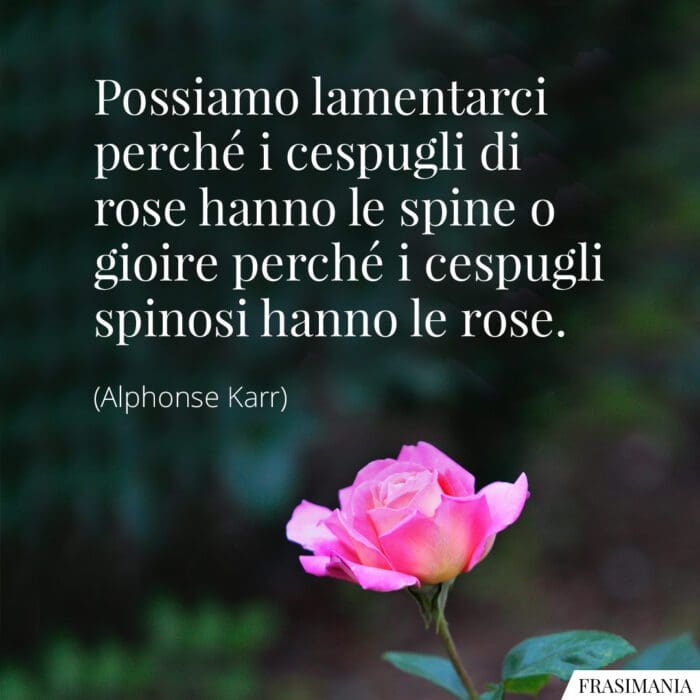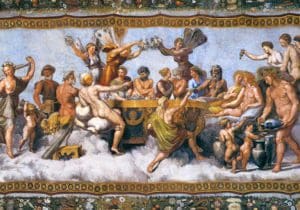
L’allegria è uno stato d’animo fondamentale per poter vivere la vita con il giusto spirito e il giusto livello di leggerezza.
Ma essere allegri non significa essere superficiali, ma al contrario per esserlo bisogna raggiungere un certo grado di saggezza.
Ecco quindi una selezione delle più belle frasi sull’allegria (in inglese e italiano) che ci insegnano ad affrontare la vita con il sorriso. Scoprile subito!
Aforismi, citazioni e frasi sull’allegria in inglese (con traduzione)
- The best way to cheer yourself up is to try to cheer somebody else up.
Il miglior modo per stare allegri è cercare di rallegrare qualcun altro.
(Mark Twain) - Nothing else in all life is such a maker of joy and cheer as the privilege of doing good.
Niente porta tanta gioia e allegria quanto il privilegio di fare del bene.
(J.R. Miller) - The most certain sign of wisdom is cheerfulness.
Il più chiaro segno di saggezza è l’allegria.
(Michel de Montaigne) 
- He is a wise man who does not grieve for the things which he has not, but rejoices for those which he has.
Chi è saggio non si addolora per le cose che non ha, ma si rallegra per quello che ha.
(Epitteto) - Nothing is more beautiful than cheerfulness in an old face.
Niente è più bello dell’allegria su un vecchio volto.
(Jean Paul) - If more of us valued food and cheer and song above hoarded gold, it would be a merrier world.
Se la maggior parte di noi apprezzasse il cibo, l’allegria e il canto più dell’oro, sarebbe un mondo più lieto.
(J. R. R. Tolkien) 
- And from the midst of cheerless gloom I passed to bright unclouded day.
E dal mezzo di un’oscura tristezza sono passata a un giorno radioso senza nuvole.
(Emily Brontë) - Cheerfulness and contentment are great beautifiers and are famous preservers of youthful looks.
L’allegria e il buon umore rendono più belli e sono dei rinomati elisir di giovinezza.
(Charles Dickens) - The devil is afraid of happy people.
Il demonio ha paura della gente allegra.
(Giovanni Bosco) 
- Rejoice in the things that are present; all else is beyond thee.
Rallegrati delle cose che sono presenti; tutto il resto è al di là di te.
(Michel de Montaigne) - A merry heart lives long.
Un cuore allegro vive a lungo.
(William Shakespeare) - Let us be grateful to people who make us happy, they are the charming gardeners who make our souls blossom.
Dobbiamo essere grati alle persone che ci rendono felici, sono gli affascinanti giardinieri che fanno fiorire la nostra anima.
(Marcel Proust) 
- Cheerfulness is the best promoter of health and is as friendly to the mind as to the body.
L’allegria è la miglior portatrice di salute ed è una buona amica della mente e del corpo.
(Joseph Addison) - After every storm the sun will smile; for every problem there is a solution, and the soul’s indefeasible duty is to be of good cheer.
Dopo ogni tempesta il sole sorriderà; per ogni problema c’è una soluzione, e il dovere indefettibile dell’anima è di essere di buon umore.
(William R. Alger) - We can complain because rose bushes have thorns, or rejoice because thorns have roses.
Possiamo lamentarci perché i cespugli di rose hanno le spine o gioire perché i cespugli spinosi hanno le rose.
(Alphonse Karr) 
- What time can be more beautiful than the one in which the finest virtues, innocent cheerfulness and indefinable longing for love constitute the sole motives of your life?
Quale periodo può essere più bello di quello in cui le cose migliori, l’allegria innocente e l’indefinibile desiderio d’amore costituiscono le uniche ragioni di vita?
(Lev Tolstoj) - An ounce of wit is worth a pound of sorrow.
Un grammo di allegria vale un chilo di tristezza.
(Richard Baxter) - With mirth and laughter let old wrinkles come.
Con l’allegria e le risate vengano pure le vecchie rughe.
(William Shakespeare) 
- Life without mirth is a lamp without oil.
La vita senza allegria è una lampada senza olio.
(Walter Scott) - The path to cheerfulness is to sit cheerfully and to act and speak as if cheerfulness were already there.
Il percorso verso l’allegria è di sedersi allegramente e di agire e parlare come se l’allegria fosse già lì.
(William James) - Cheerfulness keeps up a kind of daylight in the mind, filling it with a steady and perpetual serenity.
L’allegria mantiene una sorta di luce diurna nella mente, riempiendola di una serenità costante e duratura.
(Joseph Addison) - I have noticed that the people who are late are often so much jollier than the people who have to wait for them.
Ho notato che le persone che sono in ritardo sono spesso molto più allegre delle persone che devono aspettarle.
(E. V. Lucas) 
- So of cheerfulness, or a good temper, the more it is spent, the more it remains.
L’allegria, o il buon umore, più se ne consuma più ne rimane.
(Ralph Waldo Emerson) - Let us be of cheer, remembering that the misfortunes hardest to bear are those which never come.
Rallegriamoci, ricordiamo che le disgrazie più difficili da sopportare sono quelle che non arrivano mai.
(Amy Lowell) - To watch the corn grow, or the blossoms set; to draw hard breath over the plough or spade; to read, to think, to love, to pray, are the things that make men happy.
Guardare il grano che cresce e i fiori che sbocciano, sudare con l’aratro o la vanga, leggere, pensare, amare, sperare, pregare: sono queste le cose che rendono felici.
(John Ruskin) 
- Cheerfulness is the atmosphere in which all things thrive.
L’allegria è un mondo in cui tutte le cose diventano migliori.
(Jean Paul) - Early morning cheerfulness can be extremely obnoxious.
L’allegria di prima mattina può essere estremamente dannosa.
(William Feather) - Any man may be in good spirits and good temper when he’s well dressed. There ain’t much credit in that.
Chiunque è capace di essere allegro e di buonumore quando è ben vestito.
(Charles Dickens) - Cheerfulness in most cheerful people, is the rich and satisfying result of strenuous discipline.
L’allegria, per la maggior parte delle persone allegre, è il frutto di una faticosa disciplina.
(Edwin Percy Whipple) - I love those who can smile in trouble, who can gather strength from distress, and grow brave by reflection.
Amo coloro che riescono a sorridere nei guai, che sanno trarre forza dall’angoscia, e diventare coraggiosi con la riflessione.
(Leonardo da Vinci)

















